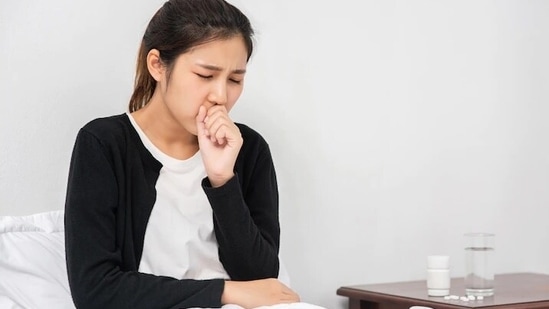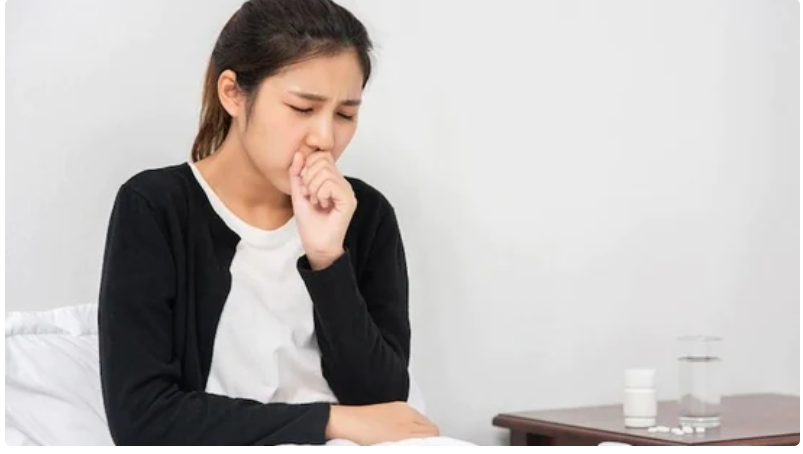As air pollution continues to wreak havoc on our health, staying indoors, avoiding early morning walks, getting vaccinated for flu and pneumonia, wearing N-95 mask while venturing out could help reduce adverse effects of air pollution.

Bronchitis cases have been on rise in Delhi-NCR and neighbouring cities as the air quality has plummeted to ‘very poor’ and ‘severe’ amid adverse weather conditions, stubble burning and post-Diwali pollution. A survey conducted by a community social media platform finds that 4 in 5 families in Delhi and adjoining areas have someone facing one or more ailments due to contaminated air. As air pollution continues to wreak havoc on our health, staying indoors, avoiding early morning walks, getting vaccinated for flu and pneumonia, wearing N-95 mask while venturing out could help reduce adverse effects of air pollution.
What is Bronchitis
Dr. Gurmeet Singh Chabbra, Director Pulmonology Marengo QRG Hospital, Faridabad says, bronchitis refers to an inflammation (swelling) of the lining of the bronchial tubes (airways in the lungs) that transport air to and from your lungs.
Dr Chabbra says bronchitis is caused by a virus, bacteria, or irritant particles that trigger an inflammation of the bronchial tubes. Smoking is considered as a key risk factor, but non-smokers may also get affected by bronchitis.
How air pollution causes bronchitis
“The temperature has started dipping. Smog is a kind of air pollution, originally named for the mixture of smoke and fog in the air. In Delhi-NCR region stubble burning is one of the major contributing factors in smog formation. It can inflame breathing passages, decreasing the lung’s working capacity and causing shortness of breath, pain when inhaling deeply, wheezing and coughing. It can dry out the protective membranes of the nose and throat and interfere with the body’s ability to fight infection, increasing susceptibility to illness,” says Dr Chabbra.
Symptoms of bronchitis
People with bronchitis often have a persistent cough that produces thick, discoloured mucus. Symptoms such as dry cough, wheezing, chest pain, low grade fever, loss of appetite, body aches, chest discomfort, fatigue and shortness of breath may also show up.
Who’s at risk
“People who smoke, are obese, have asthma, GERD (gastroesophageal reflux disease), chronic obstructive pulmonary disease (COPD) or other respiratory conditions, history of recurrent respiratory infections in childhood, have autoimmune disorder or other illnesses that cause airway inflammation are more susceptible to an attack of bronchitis or bronchitis like symptoms,” says Dr Chabbra.
Post Covid
Post Covid patients who have had severe covid pneumonia in past have susceptible lungs and are prone to bronchitis like symptoms after a respiratory infection or exposure to air pollution.
Dr Chabbra also elaborates on how to go about bronchitis diagnosis and treatment.
Bronchitis diagnosis
– To diagnose bronchitis, you may be advised by a doctor to undergo chest X-ray, blood tests, nasal swab, Sputum tests and pulmonary function tests. Chest X-ray helps detect pneumonia.
– Sputum tests are done to determine the signs of allergies or infection.
– Through pulmonary function tests, signs of asthma or COOD are checked.
– Nasal swab test is done for viruses, like Covid-19 or flu.
Treatment
– Bronchitis due to flu can be treated with antiviral medication such as Tamiflu, anti-inflammatory medications like corticosteroids and other medications.
– Cough suppressants might help with a nagging cough. If you are suffering from COPD or asthma, you may be recommended additional medications like mucolytics or breathing treatments like inhaled bronchodilator or steroids. Antibiotics may be required.
– Milder cases of acute bronchitis get better usually on its own within a couple of weeks. Symptomatic or disease specific treatment may be required for which a specialist consultation is advisable.
– Severe cases may require admission, oxygen therapy or ICU stay.
– Patients may be advised BiPAP/NIV therapy and in critical situations mechanical ventilation may be needed.
Things to keep in mind to minimise the risk of bronchitis
Dr Chabbra also suggests tips to avoid bronchitis that includes keeping air quality at home good and wearing masks when venturing out.
– Stay indoors, keep doors and windows closed
– Maintain good hydration
– Avoid early morning and late evening walks as during these cold hours air is very dense as suspended particles settle down.
– Wearing of well-fitted mask or N95 mask may be helpful in case of venturing out of the house.
– Avoid or limit smoking if you do.
– Those on inhaled medications for COPD (emphysema and chronic bronchitis) or bronchial asthma should take their medications regularly.
– Keep away from fumes, air pollution, or second-hand smoke
– Wash your hands often
– Ask your doctor and get vaccinated for flu and pneumonia (pneumococcal vaccine). Those who have not yet received Covid vaccination should take the vaccine as recommended by treating doctor.
Article Credits: Hindustan Times
